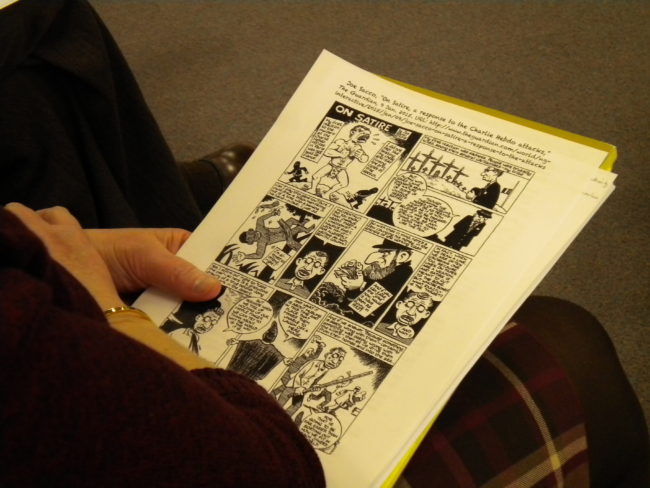
A professor of French pop culture history at the University of Alaska Southeast is questioning how Americans should show solidarity with France in the aftermath of the Charlie Hebdo shootings.
Professor Robin Walz held a seminar Friday called “I am (not) Charlie.”
When Walz first noticed #JeSuisCharlie –or I am Charlie—trending on American social media after the shootings at the French satirical magazine earlier this month, he found it somewhat misplaced.
“We can sympathize and empathize or object to the events that we see going on in France and the French responses. But whatever our responses, it’s our position from here in this continent and not from within the country in which things are going on,” Walz says.
Walz does not object to Americans showing sympathy for France, but finds it troubling when Americans try interpreting the tragedy through an American viewpoint. He says people should resist the urge to project American ideology onto France’s problems.
“Maybe there is a way they’re going to be dealing with things we can even learn from instead of always thinking that our American values are best and everybody should just follow us,” Walz says.
Walz organized the “I am (not) Charlie” seminar with three of his colleagues: Nina Chordas, Sol Neely and Lora Vess. He put the “not” in parentheses to highlight the outside perspective, where America’s First Amendment and freedom of the press may not apply.
The seminar drew in a classroom full of students and faculty. They were given a handout of cartoons penned by Joe Sacco, an illustrator for The Guardian newspaper. The cartoons are a collection of offensive racial stereotypes. Sacco ends his strip pondering the idea that the problem stems not from Muslim extremists but from France’s complex cultural identity.
“I wanted people to take away understanding that there are a lot of issues going on here,” Walz says, “and that there isn’t just sort of a position you stake out, line up behind it and then that’s the answer.”
Walz raised issues such as poverty, secularism and unemployment in France during the seminar; the point being there isn’t just one cause for the Charlie Hebdo incident.
Mel Scriven is a UAS student who spent last semester studying abroad in France. She observed some of those issues firsthand.
“The magazine seems so offensive, it seems like such a strange thing,” Scriven says. “Obviously public speech is a beneficial thing; it’s such a complicated subject area … but I wanted to learn more.”
Walz focused the seminar on the consequences that can result from the media crossing a line of sensitivity, a topic Scriven found led to even bigger questions.
“What would happen if we could not cross that line is maybe a more important question,” Scriven says.
The seminar ended with the consensus that the world has only scratched the surface on discussing this complicated subject.
